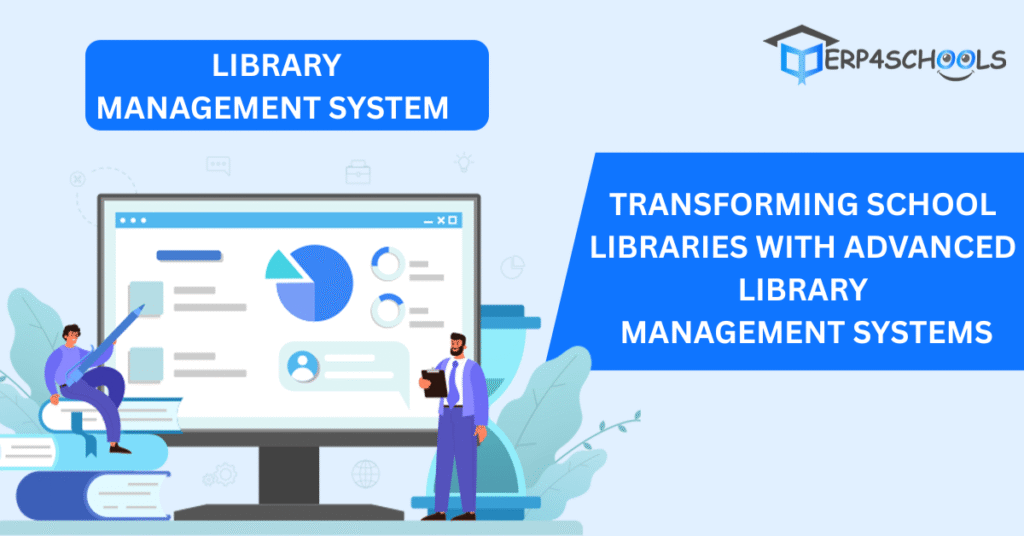Introduction to Library Management System
(LMS) is a software solution designed to streamline and automate the everyday operations of a library. It helps librarians and users efficiently manage tasks such as book cataloging, borrowing, returning, user registration, and inventory control through a centralized and digital interface.
Traditionally, managing a library required manual record-keeping and paper-based systems, which were time-consuming and error-prone. A modern Library software providers Lucknow replaces these outdated methods with an organized, user-friendly system that boosts productivity, ensures accuracy, and improves access to resources.
Whether used in schools, colleges, universities, or public libraries, an Library Management System enhances the overall experience by making information retrieval faster and library workflows more efficient.
How a Library ERP software Works in Schools?
A Library Management System in schools helps manage all the library activities digitally so that everything becomes faster, easier, and more organized for both students and teachers.
Book Entry (Cataloging) : The librarian adds all books to the system with details like title, author, and subject.
Student Registration : Students and teachers are registered in the system. Everyone gets a library ID
Searching for Books : Students can search for books on a computer or mobile by title, author, or subject. The system shows if the book is available or already borrowed.
Issuing a Book : When a student wants to borrow a book, the librarian scans the book and the student’s ID. The system records who borrowed it and the return date.
Returning a Book : The book is scanned when returned. If it’s late, the system may show a fine.
Reminders & Notifications: Students can get reminders for return dates through SMS or email
Reports: Librarians can quickly check how many books are borrowed, what’s overdue, or which books are most popular.
Why Should a School Use a Library Management System?
A Library automation service Lucknow can transform how a school library operates by automating and streamlining processes. Here are some key reasons why schools should use an LMS : Efficient Organization of Library Resources: An LMS helps organize books, e-books, journals, and other resources in a digital catalog. It allows librarians to classify and categorize resources by subject, author, title, and more, making it easy to find and manage them.
Tasks that were once done manually can now be processed quickly and accurately, reducing the workload of library staff.
Improved User Experience for Students : Students can search for books and resources from anywhere using the Library Management System. They can easily find books by title, author, or subject and check the availability status. This convenience enhances the user experience and encourages more library usage.
Automated Tracking of Borrowed Books : An LMS tracks the borrowing history of each student, automatically updating the status of borrowed and returned books. It helps the library maintain accurate records of books issued, along with due dates and late fees.
Top commercial library software easy to use
Yes, a Top commercial library software is typically designed to be user-friendly and easy to use, both for library staff and students.
Here’s why: Intuitive Interface
Most modern LMS platforms have a simple, intuitive interface that makes it easy for library staff to navigate through various functions like cataloging, issuing books, and generating reports.
Role-Based Access : LMS platforms allow role-based access, so different users (librarians, staff, students) have customized views based on their roles. This helps streamline processes. For example, librarians will have access to management features, while students can search for books, check availability, and view their borrowing history.
Quick Issue & Return Process : The process is quick—just scan the book and the student’s ID. The system automatically updates the records, reducing manual errors.
Automatic Due Date Tracking : One of the easiest-to-use features is automated due date tracking. This saves library staff from manually checking each book’s status.
The key features of a Premium library software features:
A Premium library software features comes with a variety of features designed to streamline the management of books, digital resources, and users. Below are the key features that make an LMS effective and beneficial for schools and libraries:
Automatic Cataloging : Organizes books by title, author, subject, ISBN, and more.
Metadata Management : Includes the ability to store detailed information like publisher, edition, and genre.
Advanced Search : Users can search for books by title, author, ISBN, or keywords.
Library Management System : A user-friendly, online interface that allows students and staff to search for available resources from any device.
Filters & Sorting: Allows users to filter search results based on availability, category, or language.
Check-Out & Check-In : Tracks the books borrowed by students and staff, automatically logging the issue and return dates.
Due Date Management : Automatically calculates and records due dates and overdue books.
Member Management : Student/Staff Registration: Allows users to register for library access, creating individual profiles with personal and borrowing details.
Borrowing Limits : Defines how many books a member can borrow at a time.
Membership Renewals : Manages the renewal of memberships and tracks member status.
Stock Management : Tracks the total inventory of books and resources available in the library.
Auto-Inventory Update : System automatically updates the inventory after every checkout and return.
Summary:
A School library system Lucknow is a powerful tool for schools, automating tasks like cataloging, book issuing, and tracking. It improves efficiency, reduces errors, and allows librarians to focus on more strategic tasks. With remote access, students can search for books, reserve materials, and access digital resources anytime, anywhere. Key features such as inventory management, due date tracking, and report generation greatly enhance library operations, making digital library solutions in Lucknow an essential part of modern educational infrastructure.

